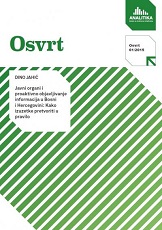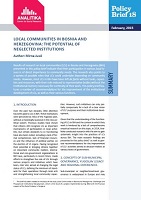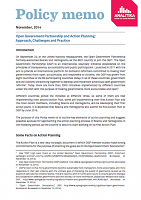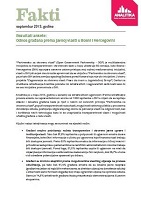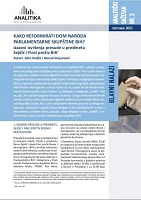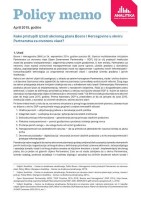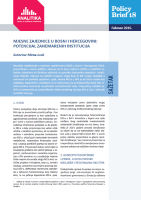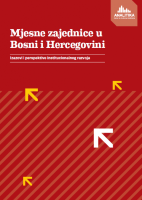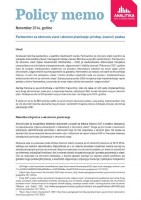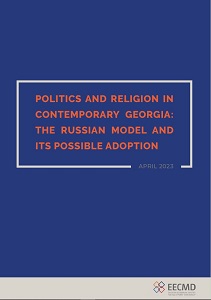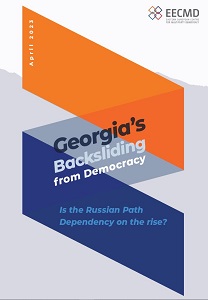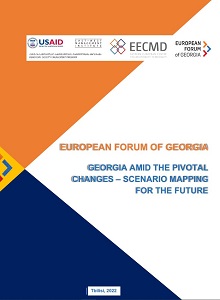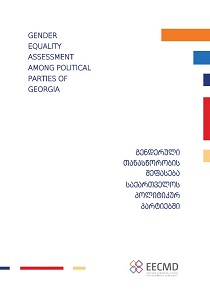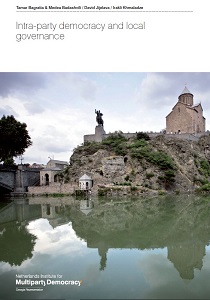Author(s): Mirna Jusić / Language(s): Bosnian
Mjesne zajednice u Bosni i Hercegovini (u daljnjem tekstu: BiH) već dugo se smatraju ostavštinom iz jugoslovenske prošlosti. Ove podopćinske jedinice, koje su u bivšoj Jugoslaviji osnovane kao centri mjesne samouprave, bile su prostori za učešće građana u rješavanju problema u zajednici. Nakon pada bivšeg socijalističkog sistema i rata od 1992. do 1995. godine, došlo je do novog političkog ustroja, a mjesne zajednice su zanemarene. U posljednje vrijeme, mjesnim zajednicama (u daljnjem tekstu: MZ) sve veću pažnju posebno posvećuju međunarodne i nevladine organizacije. Vjeruje se da kao zakonski priznate podopćinske jedinice, MZ imaju potencijal da podstaknu učešće građana. Anketa koju su 2012. godine proveli Centri civilnih inicijativa (CCI) u 14 općina u BiH pokazala je da su ispitanici, među različitim vidovima učešća na lokalnom nivou, bili najbolje upoznati sa mogućnosti učešća kroz MZ (74,6%) i da je MZ među najčešće korištenim participatornim mehanizmima (33,2%). Iako podaci ankete iz 20 općina, objavljeni u studiji Svjetske banke iz 2009. godine, ukazuju na to da većina građana nije imala iskustvo učešća u aktivnostima svoje zajednice, a od ispitanika koji su imali to iskustvo 81% opisalo je sastanke savjeta MZ-a kao najkorisniji vid učešća na lokalnom nivou. Stoga ne iznenađuje da su brojni projekti koje su do sada implementirale različite organizacije usmjereni na jačanje MZ-a. Neke su inicijative tražile izmjenu pravnog statusa i zagovarale minimum standarda u funkcioniranju MZ-a kroz lokalne akte, dok su druge bile usmjerene na jačanje kapaciteta mjesnih zajednica. Ipak, i dalje su prisutne brojne prepreke funkcioniranju MZ-a. Neki autori kao izazove navode, između ostalog, nedostatak formalnih nadležnosti ovih tijela, nedostatak finansijske nezavisnosti i nekonzistentne budžetske alokacije općina prema MZ-u, kao i utjecaj političkih partija na izbore članova savjeta i predsjednika MZ-a. Studija Svjetske banke pokazala je velike razlike u poznavanju aktivnosti MZ-a, kao i u praksama učešća u njima među lokalnim respondentima u različitim općinama: drugim riječima, MZ mogu biti manje ili više aktivne ili mogu obnašati različite uloge u zavisnosti od lokacije. Studija o komunalnim uslugama u Gradu Sarajevu iz 2013. godine govori o potencijalu urbanih MZ-a da budu spona između stanovništva i vlasti, ali ukazuje i na nezadovoljstvo radom MZ-a koje su stanovnici izrazili. To nezadovoljstvo proizlazi iz percepcije nedostatka efikasnosti MZ-a, kao i njihove nesposobnosti da pomognu građanima da svoje probleme komuniciraju prema višim nivoima vlasti. Razumijevanje funkcioniranja MZ-a u BiH, kao i konteksta u kojem ove institucije rade, otežano je zbog nedostatka sveobuhvatnih istraživanja u ovoj oblasti. Dosadašnja istraživanja o MZ-u ponudila su parcijalni uvid u različite aspekte rada MZ-a u praksi. Nedostaju osnovni podaci o MZ-u, uključujući pouzdane podatke o njihovom broju. Generalno, ne postoje službeni podaci ili procjene o broju MZ-a u BiH i takve podatke ne prikupljaju statistički uredi. Rijetke su empirijske studije o ovoj temi, a dosadašnje analize njihovog rada uglavnom su bile fokusirane na zakonski okvir koji regulira rad MZ-a. Istraživanje prezentirano u ovoj studiji urađeno je kako bi se na sistematičan način upoznali sa praksama MZ-a širom BiH i na osnovu toga ponudile preporuke za unapređenje njihova rada. Imajući u vidu nedostatak osnovnih podataka, analizirati rad MZ-a u BiH i na smislen način postaviti hipoteze o kontekstualnim faktorima koji utječu na njihov rad predstavlja izazov. Zbog navedenih poteškoća, istraživanje je uglavnom eksploratorno. Ono nastoji dati uvid u rad MZ-a i opisati njihovo funkcioniranje. Studija je strukturirana na sljedeći način: U sljedećem, drugom, poglavlju, prezentiran je pregled koncepata koji se odnose na podopćinsku upravu ili upravu na nivou susjedstva, a slijedi ga poglavlje o komparativnim praksama mjesnih zajednica u zemljama bivše Jugoslavije. Četvrto i peto poglavlje sadrže analitički okvir i dizajn istraživanja. U šestom poglavlju prezentirani su nalazi istraživanja, strukturirani prema ključnim aspektima funkcioniranja mjesnih zajednica. Nakon toga slijedi zaključak i preporuke.
More...
